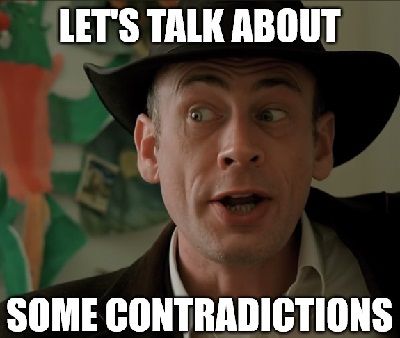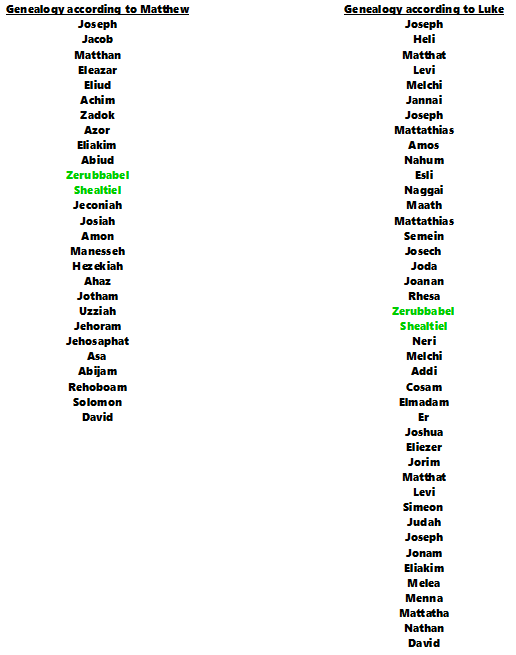The_Creation_Center
Why don't we talk about 1 thing at a time? We can start with 'are there contradictions in the Bible'.
I'd
rather start with the Deluge, considering I already provided quite a bit of material about it... but all right.

The_Creation_Center
I spent my time on websites and studied through
there their supposed contradictions.
Are we talking websites organized by skeptics, or Christian apologetics websites which make the same presupposition as you?
The_Creation_Center
Can you show me where there is one, then?
I already gave you 472. That pic of Imperfect Cell from my last post doubled as a link to them. Alternately,
here's that same list in the form of a cool, interactive chart. Some are simply minor nitpicks, but the "inerrant word of God" shouldn't contain
any contradictions at all, so even minor details are problematic to that idea.
Now, since their sheer number is probably too intimidating and/or overwhelming to tackle. how about we use the contradiction I gave you an example of from my first post: The incompatible Nativity narratives found in Luke and Matthew. Each author tells a distinctly different tale which clashes with and contradicts its counterpart. As such, one or both of the Nativity stories presented in the Bible
must be a fabrication, at
least in part.
I've broken them down to a few key points, in order to make it easier to address:
Point #1 - The Genealogy of Jesus
Both Matthew and Luke share Jesus' lineage with us. Matthew's traces his bloodline back to Abraham, providing a total of 42 names, and Luke's goes all the way back to Adam, listing 77. The two are harmonious until the time we get to King David, at which time they diverge significantly. Matthew provides 26 names between Jesus and David, Luke provides 41, and there are only two names in common past that point (which are highlighted in green):

A common explanation for this is that Luke's list is providing
Mary's lineage, but there is no explicit indication of this (nor anything to even
suggest such a thing), either in Luke itself or in any early Christian tradition. In fact, both texts are
quite clear that they focus on the genealogy of Joseph. Luke could very easily have mentioned Mary's name, even just calling her the "wife of Joseph" the way that Matthew did, but he did
not. As such, the conclusion that Luke (or Matthew) is providing Mary's genealogy is a purely apologetic one, based solely and completely on the need for Biblical harmony, but lacking any substantiation.
Point #2 - Residential Issues
Luke tells us that Mary & Joseph live in Nazareth, and that they need to go to Bethlehem on account of a Roman census which is commanded by Quirinius (a historical figure about whom much has been written). For one reason or another (the text isn't completely clear) there is not a proper place for them to stay, and Mary ends up placing her newborn son in a manger as a result. The family then returns to "their own city" (Nazareth) after a quick trip to the temple to restore Mary's "ritual cleanliness" after
the prescribed 40-day period, as per the Law.
Matthew indicates that Mary and Joseph
already live in Bethlehem; there's no mention of traveling for a census, and verse 2:11 tells us that the Magi come to "
the house" where Mary and Jesus lived. (As such, there's no mention of inns or mangers, either). By itself that doesn't seem like much, but there's more to it than that. Before they come to "the house", the Magi first go to Herod's palace, assuming that the "newborn king" would be there because of the portents they saw in the heavens which told them as much. In verse 7, we are told that Herod "found out from [the Magi] the exact time the star had appeared", which is significant because of his later command to kill all male children
under the age of two. (Verse 16 reiterates this.) Since the Magi state that they've been following the star "since it rose", that would indicate that Mary, Joseph and Jesus had been residing in Bethlehem for
at least two years.
Further support for this can be found in verses 19-23 of the same chapter. After fleeing to Egypt to escape Herod's anger, Joseph is told in a dream that it is safe to return to Israel since Herod is dead. However, upon hearing about Herod's son Archelaus (
who was actually an even bigger jerkass than his father), Joseph "withdrew to the district of Galilee, and [they] went and lived in a town called Nazareth", indicating that it was not actually their original destination. Luke explicitly says they
returned to Nazareth, but Matthew says that Jesus' family "went and lived" there, indicating that it was a new home for their family rather than the place where they started from.
On a side note: speaking from a strictly geographical point of view, if Joseph was living in Nazareth when the Massacre of the Innocents was (allegedly) ordered, he'd have to travel south past Jerusalem to get to Egypt, which would in effect take Jesus
closer to the very danger they were trying to avoid. Leaving from Bethlehem, by virtue of being south of Jerusalem, would incur no such added peril, and this is where Matthew tells us they departed from, because that was where they lived at the time.
Point #3 - The Guest List
As mentioned before, Matthew tells us that eastern Magi are the first to visit baby Jesus. Luke makes no mention of these Magi (nor any of the infanticidal fallout which happens as a result of their visit), but instead tells us that local shepherds were the first to visit him (after being sung to by a "multitude of angels" which, much like Matthew's star, nobody else saw).
Point #4 - The "Christmas Star"
According to Matthew, a wondrous star leads the Magi to Bethlehem. No one else in the astronomical world seems to see this amazing star and report it, but what's important in this conversation is that
Luke doesn't see it either. He also makes no mention of the Magi who come along with it, nor the Massacre of the Innocents, nor the trip to Egypt.
There are numerous theories about the nature of the star
itself, including (but not limited to) the "star" actually being a comet (usually Halley's), that it was a conjunction of
several stars (though one would think that the Magi would know the difference, since they were astrologers), but none of these really pan out with other details in the story for various reasons.
Halley's Comet
did pass by us in the year 12 BC. Ancient writers often described comets as "hanging over" specific cities, just as the Star of Bethlehem was said to have "stood over" the "place" where Jesus was. However, astrologers of the time viewed such things as portents of catastrophe, so the Magi probably would have viewed such a thing as an ill omen rather than a sign of hope. Furthermore, 12 BC puts Jesus' birth significantly sooner than most Christian models (which say he was born between 6-5 BC).
Likewise, there were several significant astronomical conjunctions around that time as well. Between 3–2 BC there was actually a series of seven of them, including a strikingly close conjunction between Jupiter and Venus near Regulus on June 17, 2 BC. Another Jupiter/Venus conjunction occurred earlier in August, 3 BC. However, all of these events occurred after the death of Herod in 4 BC, so the Magi wouldn't have been able to talk to him if they'd been following these events. Even if Herod
were alive at that time, these conjunctions would have been seen
in the west, meaning that they couldn't have led the Magi southward to Bethlehem from Herod's palace in Jerusalem.
Point #5 - The Massacre of the Innocents
Matthew tells us that Herod, in his jealousy of the "newborn king", sanctions a military operation to kill every male child under the age of 2 in Judea. I'd imagine that such an event would be a big deal, as tyrants who order mass murders typically get talked about for doing such things. However, no historians ever made any note of this seemingly significant event, nor is there any archaeological evidence to suggest it ever happened... which I suppose could be used as evidence in support of Luke's version of the story, since the Massacre is not mentioned in it. Further suspicion is cast by Luke 2:41, which comments that Jesus' family annually went to Jerusalem for the Festival of the Passover, and flies in the face of Matthew's reason for their relocation to Galilee.
The Massacre also presents a problem concerning John the Baptist. According to Luke, John was only 6 months older than Jesus, and would have been caught up in Herod's purge on account of his family living in "Hebron, in the hill country of Judea". This makes the historicity of the event even
more dubious, since even in Matthew (the only one of the gospels which speaks of the Massacre) we see John as an adult.
Point #6 - The Census
The Census of Quirinius is one of two historical markers that Luke
uses to date the birth of Jesus, with the second being
the reign of Herod the Great. However, records tell us that Quirinius became the governor (or, rather, Imperial Legate) for the province of Syria-Cilicia in the year 6 BC, whereas Herod died
two years prior to this happening, in 4 BC. Furthermore, the scenario presented by Luke is unrealistic in other ways as well. Almost all scholars agree that people would not be required to travel in order to register for tax purposes, but rather the taxation officials who would have gone out to them, as they would have had to link property to its owners. Furthermore, since Luke tells us Joseph was a resident of Galilee rather than Judea, he would not have been affected by such a census by virtue of living in another province.
Bearing these things in mind, there is pretty much no way that these two distinct stories are actually
the same story, and that they are "just focusing on different details", as apologists love to say. In all likelihood, the authors of Matthew and Luke were as ignorant of the other's work as they were of the events they were writing about, resulting in two men writing two different stories, each trying their hardest to link their version to as many messianic prophecies as they could, and ironically causing problems for the other.
Now, if you'd like you can address each of these points one-by-one with separate posts, break the post into sections with [SP0ILER] boxes, or however you want to do it. The ball's in your court.
 200
200
 150
150
 200
200




